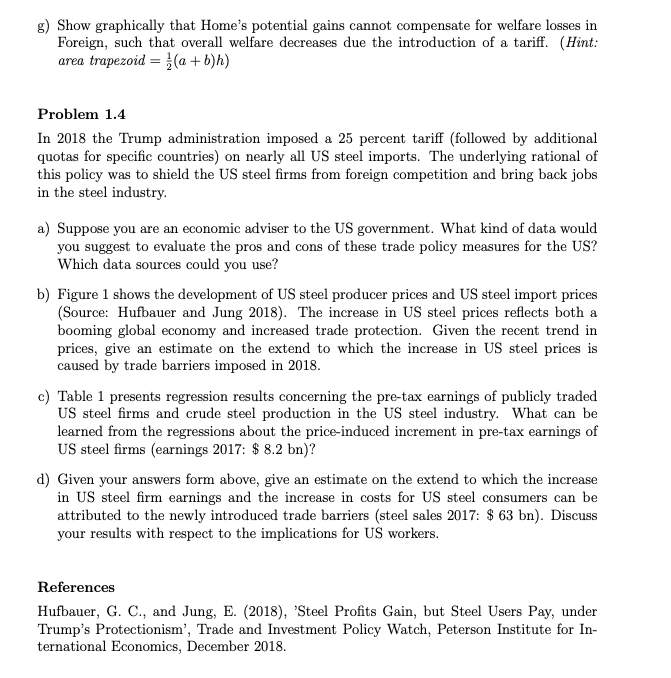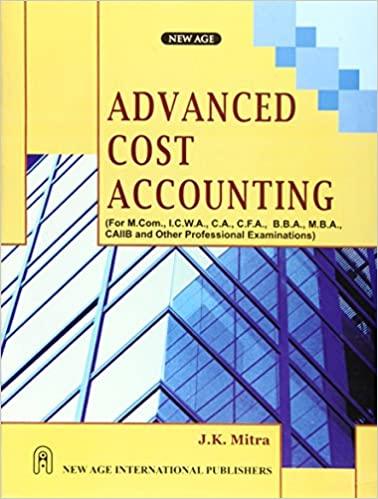
g) Show graphically that Home's potential gains cannot compensate for welfare losses in Foreign, such that overall welfare decreases due the introduction of a tariff. (Hint: area trapezoid =21(a+b)h) Problem 1.4 In 2018 the Trump administration imposed a 25 percent tariff (followed by additional quotas for specific countries) on nearly all US steel imports. The underlying rational of this policy was to shield the US steel firms from foreign competition and bring back jobs in the steel industry. a) Suppose you are an economic adviser to the US government. What kind of data would you suggest to evaluate the pros and cons of these trade policy measures for the US? Which data sources could you use? b) Figure 1 shows the development of US steel producer prices and US steel import prices (Source: Hufbauer and Jung 2018). The increase in US steel prices reflects both a booming global economy and increased trade protection. Given the recent trend in prices, give an estimate on the extend to which the increase in US steel prices is caused by trade barriers imposed in 2018. c) Table 1 presents regression results concerning the pre-tax earnings of publicly traded US steel firms and crude steel production in the US steel industry. What can be learned from the regressions about the price-induced increment in pre-tax earnings of US steel firms (earnings 2017: $8.2bn )? d) Given your answers form above, give an estimate on the extend to which the increase in US steel firm earnings and the increase in costs for US steel consumers can be attributed to the newly introduced trade barriers (steel sales 2017: \$63 bn). Discuss your results with respect to the implications for US workers. References Hufbauer, G. C., and Jung, E. (2018), 'Steel Profits Gain, but Steel Users Pay, under Trump's Protectionism', Trade and Investment Policy Watch, Peterson Institute for International Economics, December 2018. g) Show graphically that Home's potential gains cannot compensate for welfare losses in Foreign, such that overall welfare decreases due the introduction of a tariff. (Hint: area trapezoid =21(a+b)h) Problem 1.4 In 2018 the Trump administration imposed a 25 percent tariff (followed by additional quotas for specific countries) on nearly all US steel imports. The underlying rational of this policy was to shield the US steel firms from foreign competition and bring back jobs in the steel industry. a) Suppose you are an economic adviser to the US government. What kind of data would you suggest to evaluate the pros and cons of these trade policy measures for the US? Which data sources could you use? b) Figure 1 shows the development of US steel producer prices and US steel import prices (Source: Hufbauer and Jung 2018). The increase in US steel prices reflects both a booming global economy and increased trade protection. Given the recent trend in prices, give an estimate on the extend to which the increase in US steel prices is caused by trade barriers imposed in 2018. c) Table 1 presents regression results concerning the pre-tax earnings of publicly traded US steel firms and crude steel production in the US steel industry. What can be learned from the regressions about the price-induced increment in pre-tax earnings of US steel firms (earnings 2017: $8.2bn )? d) Given your answers form above, give an estimate on the extend to which the increase in US steel firm earnings and the increase in costs for US steel consumers can be attributed to the newly introduced trade barriers (steel sales 2017: \$63 bn). Discuss your results with respect to the implications for US workers. References Hufbauer, G. C., and Jung, E. (2018), 'Steel Profits Gain, but Steel Users Pay, under Trump's Protectionism', Trade and Investment Policy Watch, Peterson Institute for International Economics, December 2018







